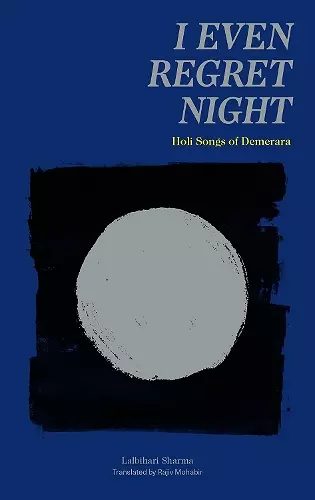I Even Regret Night
Format:Paperback
Publisher:Kaya Press
Published:24th Sep '18
Currently unavailable, our supplier has not provided us a restock date

Winner of the Academy of American Poets Harold Morton Landon Translation Prize, 2020 Award-winning Indo-Caribbean poet Rajiv Mohabir (born 1981) brings his own poetic swagger and family history to a groundbreaking translation of Lalbihari Sharma's Holi Songs of Demerara, originally published in India in 1916—the only known literary work written by an indentured servant in the Anglophone Caribbean. Sharma, originally from Chapra in the current Indian state of Bihar, was bound to the Golden Fleece Plantation in British Guyana. His poems about the hardships of ""coolie"" life on the island were originally published in the Bhojpuri dialect as a pamphlet of spiritual songs in the style of 16th-century devotional poetry. I Even Regret Night brings Mohabir's new translation of Sharma's text together with a contextualizing introduction by Gaitra Bahadur, who found the manuscript in the British Library, and an afterward by Mohabir exploring the role of poetry in resisting the erasure of this often-overlooked community.
Aching for home is a sentiment as ancient as the history of migration in the Americas, but so is the role of poetry and song as personal antidotes to the pangs of loss and as communal vehicles for expressions of love. During these troubling times when our various communities are under siege, we comfort our aching hearts with the testimonies of strength from our ancestors who were immigrants, exiles, refugees, and slaves. What a timely arrival is I Even Regret Night! What a blessing to have a voice that rises above the burdens of indentured servitude and that graciously empowers our affection for culture, language, religion, and identity. -- Rigoberto González * Rigoberto González *
A suddenly recovered world of American spiritual folksong opens up here, in these celebrations by Lalbihari Sharma. Mohabir’s “chutney” translations make the loss, longing, and hope, sting again. It is as though Guyana's cane plantations always harbored India’s gods of the dispossessed. Here is Kabir’s tradition, here Mirabai’s, but native to the soil of the Americas: pungent, salty, hopeful, quick. These songs make your hair stand up. Mohabir gives them with a stirring account of translation as family-discovery. Gauitra Bahadur in a sharp essay tells the near-miracle of finding a lost manuscript, and with it, an all but lost history. * Andrew Schelling *
Much has been written about the people who were brought— at the end of the 19th and into the early 20th century— to the British West Indian colonies to work the cane fields, but the voices of the workers themselves have been either silent or imagined by theorists and by their yearning ancestors. And if we do hear from them, it is usually, until now, about their very real tribulations as indentured laborers. Rajiv Mohabir’s important translation of Lalbihari Sharma’s poems, a literary expression that will challenge and alter our preconceptions of the early Indian worker in the Caribbean, is a rare and important glimpse into the life and mind of a man whose voice soars well above the position of laborer in someone’s else’s service. The cane field is and is not present in these poems, it is not the whole, the laborer is an individual, a learned person, humanist, poet, lover and dreamer; he is undefeated because of creativity and the richness of his mind. Mohabir's essay on how he himself came to poetry and to this work by Sharma, is itself an enlightening and delightful revelation. Thank you Rajiv, for this beautiful service to our past, and to our future. * Shani Mootoo *
ISBN: 9781885030597
Dimensions: unknown
Weight: unknown
80 pages